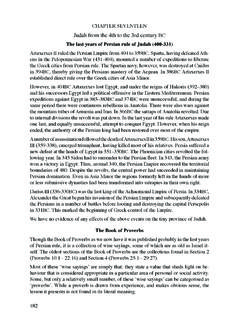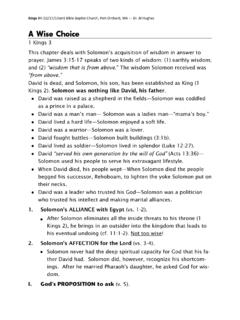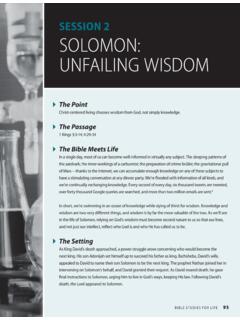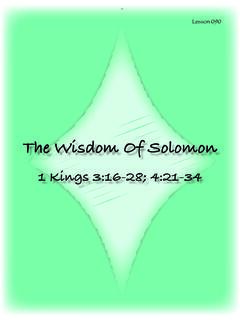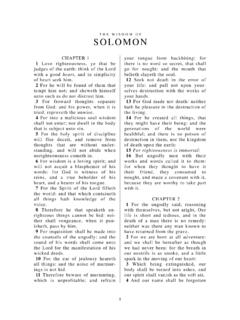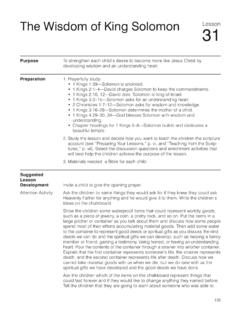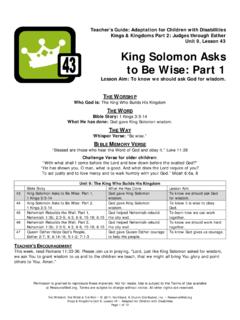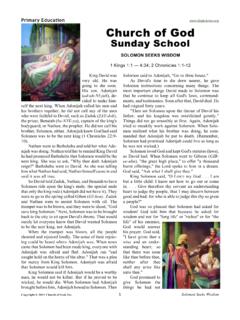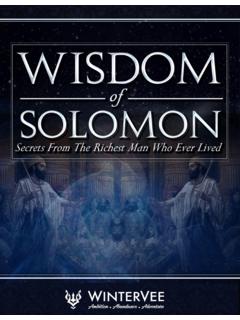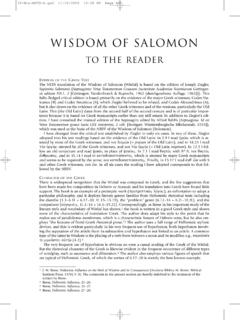Transcription of THE WISDOM OF SOLOMON - mbfallon.com
1 193 THE WISDOM OF SOLOMON194195 INTRODUCTION196 The authorWe do not know the name of the author of The WISDOM of SOLOMON . He was a Jew living and teaching in Alexandria probably during the Roman period, that is, sometime in the last decades of the first century BC or the early decades of the first century AD. There are many parallels with the writings of his contemporary, Philo (c. 25BC 45AD), the most famous Jew living in Alexandria at the time It is evident from his writing that the author of The WISDOM of SOLOMON was well versed in the Jewish Scriptures, and also in Hellenist religious and philosophical thought1. The mood of the Hellenist writings of the period was consciously religious and inclusive, and there was much interchange of ideas between the Middle Platonists, the Epicureans and the Stoics.
2 This would have been very attractive to our author s Jewish students. It provided a challenge to their traditional faith, but also opportunities. Their teacher, the author of the book we are studying, was keen to make as many connections as he could with contemporary Hellenist culture. If Judaism remained locked into the tradi-tional Hebrew way of looking at the world, there was a danger that non-Jews would see Judaism as standing in the way of civilization, human progress, and the unity of mankind to which they aspired. To counteract this our author encouraged his students to engage with Hellenist thought, while recognising its limits and defects, and to value the special contribution their own Jewish traditions could make to the culture.
3 He writes enthusiasti-cally of the temple (9:8), the Torah (18:4), the heroes of Israel (10:1-21), and begins his work by referring to the prophetic ideal of justice (1:1). It is their privileged mission as Jews to offer the world the incorruptible light of the Torah (18:4).Another feature of life in Alexandria at the time was the mystical cult of the Egyptian goddess, Isis. This, too, had many attractions for a Jew who was keen to find a place in the vibrant world that was Alexandria. This was especially attractive in light of the fact that they did not have a temple in Alexandria and so felt the absence of the cult that was so important to their fellow Jews in Jewish students for whom this work is composed must have been educated in Greek literature, philosophy, rhetoric and science, as well as in their own Jewish traditions.
4 Their teacher is encouraging them to learn from the best of Hellenist philosophy and religion, but he is insisting that God had chosen for them a priceless gift to offer their contemporaries. The key point that our author makes throughout the book is that what was good in Hellenist culture was a gift of divine WISDOM from YHWH2, the personal God who chose to reveal himself to the Jews. 1 Readers interested in exploring this connection can find a multitude of examples in the excellent com-mentary on The WISDOM of SOLOMON by David Winston in the Anchor Bible Series (Doubleday, 1979, 360 pages). The bulk of his commentary is given over to searching out parallels between The WISDOM of SOLOMON and Greek philosophical and religious texts.
5 I would also recommend Hellenistic Influence on the Book of WISDOM and its consequences by James M. Reese (Analecta Biblica 41, published by the Biblical Institute Press, Rome, 1970, 197 pages).2 Spelt thus throughout in deference to Jewish practice of not pronouncing the divine name or writing it in its pronounceable form. When they read YHWH, they bow their head and say the word adon y ( Lord ). Whence the expression the Lord (Greek: ku/rio ) throughout the Septuagint (see WISDOM 1:1).Introduction197 The highest expression of divine WISDOM is the Torah, and the Torah is God s correc-tive to the errors in Hellenist thought, and the means of bringing to perfection its limited insights.
6 Our author s hope is that this will also appeal to the cultured non-Jews in Al-exandria who were attracted to draws on the Biblical traditions of creation, of the presence and action of God in the history of Israel, and in the reflections on divine WISDOM as found especially in the Book of Proverbs and in The WISDOM of Ben Sira. However, while he draws on these traditions he chooses to use the language, not of the Septuagint, but of Hellenist literature and of the Isis cult. The Book of Proverbs contains ancient Hebrew WISDOM . Ben Sira, like our author, was a teacher, but he was writing two centuries earlier in Jerusalem and in Hebrew. Our author lived in a very different world and in a very different time, with a very different language and intellectual sees the key defect of current Hellenistic thought as its failure to recognise YHWH, the One, Living God, the personal God of Judaism, Creator of all that is.
7 This God is revealed through WISDOM (9:2-6), through his Word (16:12; 18:15-16), especially in the Torah (16:6; 18:4), in nature (13:4-5) and in his wondrous interventions (5:2-5; 18:3). For all their religious earnestness, Hellenist writers saw WISDOM as a human achievement. For our author it is a gift from God. The initiative is always from God who wants his creatures to live in intimate communion with him. God created us to enjoy this intimate communion, and offers it as a gift to those who welcome the gift of divine WISDOM , and live accordingly. He speaks of this intimate communion, using the metaphor of sexual intimacy popular in the Isis cult (see 6:12-14; 7:28; 8:2-18).
8 Neither the Book of Proverbs nor the WISDOM of Ben Sira envisaged a life of commun-ion with God after physical death. Under the influence of Hellenist thought, our author embraced the idea of human beings consisting of matter informed by a soul. With physi-cal death the matter corrupts. The soul, however, is immortal. However, here again, he understood our immortality differently. For Plato the soul was innately indestructible. For our author, it is God who graciously offers eternal communion to those who welcome his gift of WISDOM . It is divine WISDOM that takes the initiative (6:13). We are being offered this communion even before we become conscious of its influence (7:12).
9 It is divine WISDOM that is the source of all virtue (8:7). It is only through the gift of WISDOM that we can come to know the will of God and respond to it (9:17).In Part One (1:1 - 6:21) he focuses on our eternal destiny: communion with God. Divine WISDOM is God s gift drawing us into this communion, which we will enjoy only if we seek the Lord (1:1), by welcoming WISDOM and living accordingly (6:9)In Part Two (6:22 10:21) he offers detailed instructions on what we are to do to obtain God s gift of eternal blessedness. We are to take divine WISDOM as our bride (8:2), and live justly by seeking and obeying Part Three (11:1 19:22) he invites the reader to reflect on God s providence as seen in the WISDOM of SolomonThough SOLOMON is never mentioned by name in the text, the book is entitled The Wis-dom of SOLOMON in Codex Vaticanus (fourth century), Codex Sinaiticus (fourth century), Codex Alexandrinus (fifth century), and other early manuscripts.
10 The attribution to SOLOMON is found also in Proverbs (see especially sections 2 and 4), Ecclesiastes and the Song of Songs. It is a way of claiming authoritative WISDOM for the book by linking it to the son of David whom tradition saw as the wisest of men. In the Book of Kings we read: SOLOMON composed three thousand proverbs, and his songs numbered a thousand and five. 1 Kings 4:32 God gave SOLOMON very great WISDOM , discernment, and breadth of understanding as vast as the sand on the seashore. 1 Kings 4:29 King SOLOMON excelled all the kings of the earth in riches and in WISDOM . 1 Kings 10:23We find this tradition continued in the Newer queen of the South will rise up at the judgment with this generation and condemn it, because she came from the ends of the earth to listen to the WISDOM of SOLOMON , and see, something greater than SOLOMON is here!

